Communicating Research Workshop, Mary 23rd

Your source for what's new at Mizzou Libraries

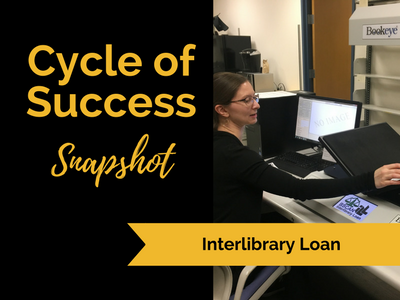
Ever wonder who is behind the magic of Interlibrary Loan? At the Health Sciences Library it’s Katy Emerson.
She’s the one who receives your requests, scans what you need, and emails it to your inbox, all in the matter of a few hours.
If you search for an article and are hit with a paywall or told the library doesn’t have access, don’t worry! You can request it and Katy will work her magic.
Not only will she find articles the library doesn’t have access to, she will often scan items we have on site to save you the trip to your library.
“What I like most is getting to deliver articles to clinicians. It feels good knowing that the work I do could be having a positive impact on patient care.”
Last year, Katy and the Health Sciences Library’s Interlibrary Loan department borrowed close to 4500 articles and delivered another 1800 articles we had available on site all at no cost to our users. Interlibrary Loan is a free service for Mizzou.
To request articles and books, click on the Findit@MU button if it’s available or you can always fill out a request form.
Cycle of Success is the idea that libraries, faculty, and students are linked; for one to truly succeed, we must all succeed. The path to success is formed by the connections between University of Missouri Libraries and faculty members, between faculty members and students, and between students and the libraries that serve them. More than just success, this is also a connection of mutual respect, support, and commitment to forward-thinking research.
If you would like to submit your own success story about how the libraries have helped your research and/or work, please use the Cycle of Success form.
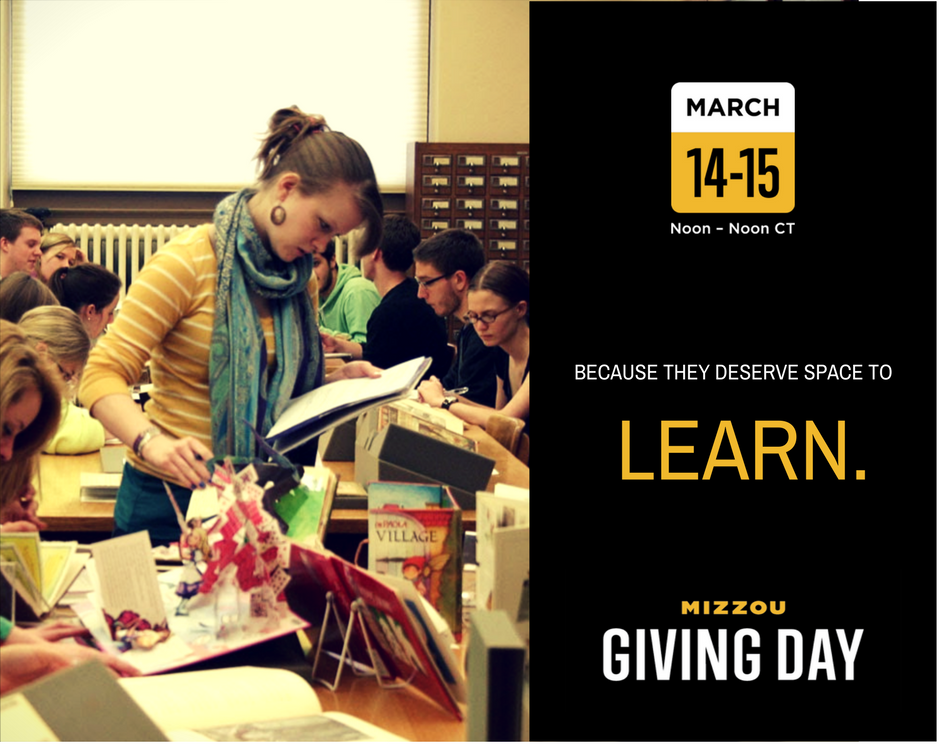
Are you prepared to participate in the Mizzou Giving Day 2018 social media challenges?? Get ready to tweet…
March 14
March 15
NEVER FORGET that awesome moment last year when Mizzou undergraduate Taylor Tutin won $900 for Mizzou Libraries during a social media challenge!! THANK YOU, TAYLOR!
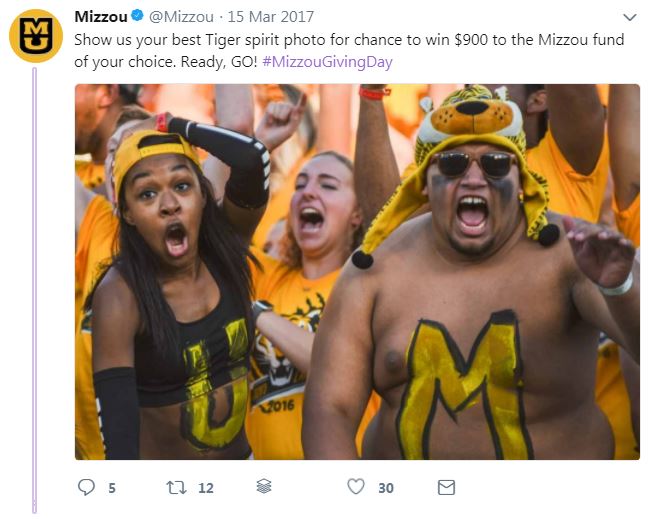
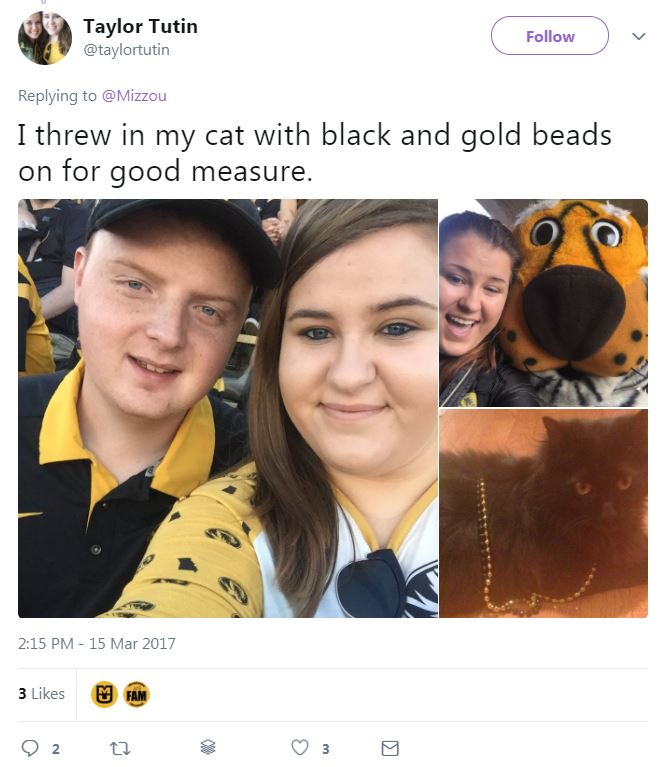
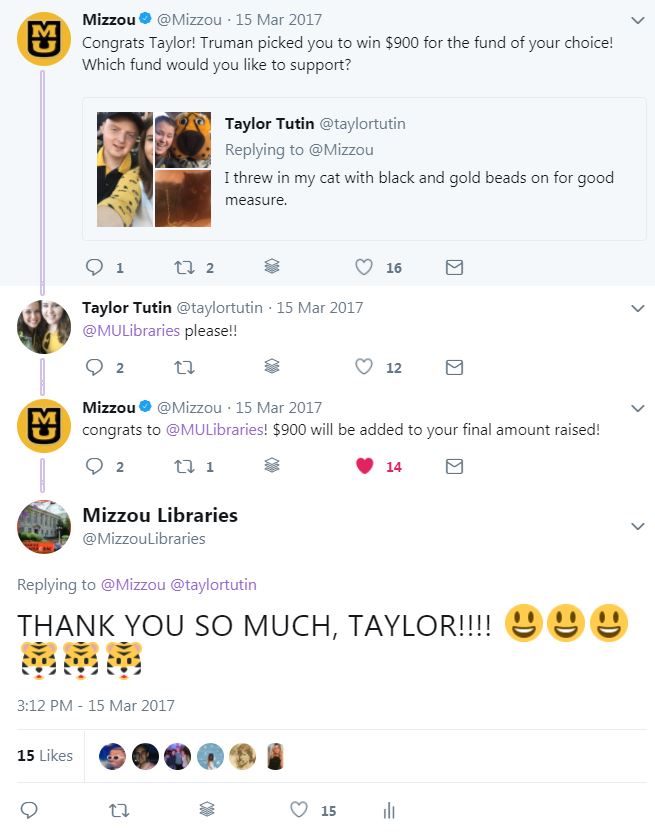
Save

Mizzou Giving Day is a day for everyone who loves Mizzou to combine our support and maximize our impact. This year’s 24-hour campaign will take place from noon on March 14 to noon on March 15.
Schools, colleges, and campus programs will have the opportunity to earn additional support from two “prize pools”. Prizes will go to the top five finishers in each competition. Generous donors have contributed challenge funds that provide a way for social media users to win funds for the University Libraries.
This year’s challenges include:
The University Libraries priorities for this year’s Giving Day:
Special Collections & Rare Books Renovation Fund
need text
Friends of the Library
The University of Missouri Libraries have been leaning on the Friends of the Library since a group of alumni and friends met in the Student Union in 1960 with an idea to make our university stronger. They recognized that a gift to University Libraries impacts every student and every program. Please join us as we set our sights on 1,000 members in Friends of the Library! Great universities have great libraries. Help us build a better Mizzou by supporting the core of the academic experience, our libraries!
Collection Enhancement Fund
This fund provides for the care and growth of our collections. If you are interested in supporting access to scholarly material, this is the fund for you! Help us complete our progress toward $50,000 for collections enhancement.
Your support will make Mizzou Giving Day a success. Use the hashtag #MizzouGivingDay — on Facebook, Twitter and Instagram — to spread the word and inspire other Tigers to make a difference at Mizzou.
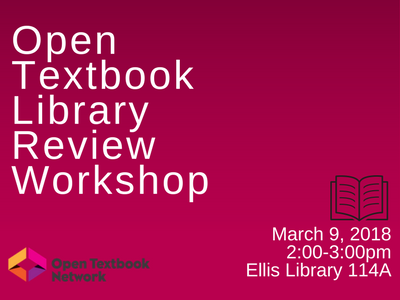
Are you an instructor who is concerned about the impact of high textbook costs on your students?
Explore possible open textbook solutions by attending the Open Textbook Library Review Workshop — a one-hour session where you can discover open textbooks in your field. After the workshop, you’ll be asked to write a short review of an open textbook from the Open Textbook Library Your review will benefit other faculty considering open textbooks. You’ll receive a $250 stipend* for your participation and written review.
*Because not all subjects are covered in the OTL, this will not be an open event. Faculty from specific departments will be invited to participate. $250 participation award from the A&OER grant program will be provided to each faculty member who both attends the workshop and completes a OTL textbook review.
Date: March 9th, 2018
Time: 2-3pm
Location: Ellis Library 114A
Registration URL: http://bit.ly/OpenTextbookWorkshopRegistration
More information:

We all know that everyone is busy and you don’t want to return equipment late and find out that you have fines for returning it late.
Fines for Reserve Books & Equipment
Overdue Books on Reserve = $2/hr/book
Overdue Equipment = $2/hr with $50 maximum
Items not returned will need to be replaced with an exact replacement. Items not returned or replaced will result in a replacement cost and loss of MU Library checkout privileges and if replacement costs are high enough and you do not respond to emails about overdue or billed equipment, you can have a report filed on you at the Student Conduct Center. Always answer any emails about overdue equipment. Equipment must be returned or replaced. Fines can be negotiated on request.
Returning Overdue Reserve/Equipment Items Will Not Remove Fines

http://www.unboundbookfestival.com/
This interdisciplinary conference, which will be held at the MU Department of Theatre, will take place in conjunction with the University of Missouri Press publication of Lanford Wilson: Early Stories, Sketches, and Poems, edited by David A. Crespy, a new production of The Rimers of Eldritch presented by the university theatre department, and MU Library’s recent procurement of the Lanford Wilson Collection, an archive that is available to conference attendees for research and study. Registration is free.
The Library Society’s 14th annual event will be a reception with the Legacy Society featuring Marshall W. Mason, a Tony award-winning director. In addition, guests will enjoy heavy hors d’oeuvres, a full bar, and a jazz quartet. The reception will take place from 4:30 to 7 p.m. in the Ellis Library Grand Reading Room.
For more information about any of these events, contact University Libraries Advancement at 573-882-4701 or vosss@missouri.edu.
Imagine a world with unlimited access to any and all kinds of information. There’d be no barriers to learning. Books, music, video, software and other media would be freely available to everyone. Brewster Kahle dreams about creating such a world.
Read more at the Reynolds Journalism Institute blog: Is universal access to all knowledge an attainable goal?
In order to better understand what a great academic library is, ULSAC will be sending members to the Research Triangle in North Carolina to collect information that will aid in the creation of the Student Vision Project. Attendees will report back to ULSAC on the great academic libraries at Duke University, North Carolina State University, and the University of North Carolina. Their perspective will shape the final draft of the Student Vision Report, which will be used to communicate with stakeholders and administrators on how Mizzou Libraries should best serve student needs moving forward.
Congratulations to the following ULSAC members who have applied and been approved:
There is still one remaining slot. All ULSAC members and Library Ambassadors are encouraged to apply.
At the Internet Archive’s headquarters in San Francisco, California, on Wednesday, technologists, educators, archivists, and others fact-oriented folks gathered to discuss how they and the like-minded can save news from the memory hole.
Read more at the Reynolds Journalism Institute blog: Inside Internet Archive: 10PB+ of storage in a church… oh, and a little fight to preserve truth